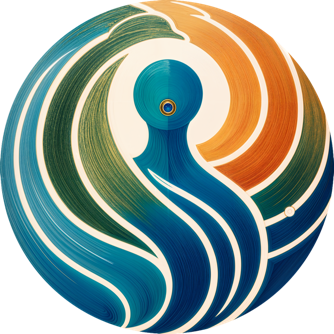
The Person-Centered Institute of Asia Logo
About The Person-Centered Institute of Asia
The Person-Centered Institute of Asia (PCIA) is the full name of The Person-Centered Institute of Asia. Our legal entity is registered in Hong Kong. PCIA’s WeChat number is currently hosted by Carl Rogers (Shenzhen) Consulting Services Ltd. Contents of this article: 1. Vision 2. Specific Project
We want to make the world a better place
Last autumn Annzo and I went to Chicago to visit our person-centred teachers. One afternoon we sat down with Margret Warner. We asked her, ‘Why is there such a high percentage of gays and lesbians in the Person-Centered community? She said, ‘Because in the 1950s the Carl Rogers Counselling Centre was the only place in North America where homosexuality was not considered a disease. When she said that, it was as if something hit me inside and my whole being suddenly sank into an indescribable emptiness and a deep sense of acceptance.
At that moment it was as if I had seen those people who, more than half a century ago, had been rejected, alienated and treated as ‘sick’ in mainstream society, finally having a space where they did not have to hide and were not humiliated. This is not the first time I have been deeply moved by this. A few years ago, at the ADPCA conference, Gay Leah Barfield, the ninety-year-old director of Rogers’ World Peace Project, told us a story: ‘Many, many years ago, in one of our congregations, there was an ex-Nazi officer and a concentration camp guard. A former Nazi officer and a concentration camp survivor. They started out with a hatred for each other that they could never let go of. But by the end of a week of heart-to-heart group, they loved each other deeply. There was silence in the meeting room. What is the power that allows hatred to dissolve, wounds to heal, and two people who should be at odds to love each other?
Over the years I have pondered what exactly is at the heart of a person-centred approach. There seem to be too many different answers to this question, but the one thing that doesn’t change in any of them must be a deep respect and trust for people, an attitude of treating people as people. It is not so easy to treat people as they are, to treat life as it is. Growing up in China today, I don’t really appreciate what it’s really like for a person to be allowed to be themselves. Instead of having the right to self-definition, a person is defined by test scores, marriage and parenthood, behavioural norms, wealth and status. Over the decades, despite the economic boom, the phenomenon of ‘not treating people as human beings’ has grown stronger and stronger; there are always people who are mercilessly left behind in the tide of people chasing the wind.
I remember when I was in primary school, my English teacher commented in public on my poor exam results: ‘It’s a shame on your parents that they gave birth to such a stupid child as you’. I often imagine that if I were a primary school teacher today, and I came across a child with poor grades, I would pat him on the back and say: ‘You did badly in the test, and I know you’re having a hard time. It’s really not easy. I just want you to know that I’m here for you. You matter. When our society treats people as a means to an end rather than an end in itself, people cannot be themselves, and relationships and attitudes between people are filled with cruelty rather than gentleness and warmth.

We live in a country with deep historical trauma. The English teacher who humiliated me was not born with malice. It’s just that our history and culture have not given her the soft ground to be deeply herself. As I met client after client in the counselling room who could not be themselves because of the barrenness of their environment, I began to understand why Rogers shifted his interest from counselling to a larger field in the second half of his life. Because if we don’t change the world we live in, we will always be limited to reactive remedies. And if we can influence everyone around us just a little bit to have a little more space to be themselves, then their attitude towards others will change just a little bit. When a community has the space for everyone to be themselves, the collective will naturally develop the resilience to accept differences and the warmth to value humanity.
This is the vision of the Person-Centered Institute of Asia. The person-centred approach has never been just a counselling model or technique. It is a way of being, a fundamental view of life and humanity. It recognises the irreplaceable value of every life, no matter what form it takes. How we treat a person who is physically and mentally healthy is how we treat a person who is in need; how we treat a person who has a similar life background to ours is how we treat a person who has nothing to do with us. There is so much light and possibility in human nature and we want it to be seen gently. I often think of Rogers’ work in the 1960s on racial issues, conflict mediation and educational emancipation. Today we want to recapture that spirit in the Asian region - not just in the consulting room, but in the wider social and cultural dimensions. And everyone reading this has the opportunity to be part of that effort.
Next, I’ll explain in more detail the programmes and activities of the Person-Centered Institute of Asia, and how everyone can get involved:

Goal One: Connecting Person-Centered Communities in the Asian Region and Worldwide
Projects: Asia Society, Asian Person-Centered Conference, Person-Centered Asia Journal, Roundtable Forums
Introduction: We currently have links with representatives from Japan and Vietnam. In the future we will continue to connect with communities in more Asian countries and regions. We expect to hold an Asian person-centred conference within a year, offering workshops, community heart groups and forums in different languages to give person-centred practitioners from different countries the opportunity to connect at a local Asian conference. We plan to hold one or more round table forums where person-centred practitioners from different countries will be invited to exchange ideas on a pressing issue of the day. We plan to establish an Asia-based academic journal on person-centredness within 3 years.
We have also contacted the Person-Centered World Association (PCE-World). PCE-World will form a working group to assist us in establishing an Asian Association for Person-Centered Counselling and Therapy. The Asian Association will take on the functions of accrediting training programmes, registering and recognising counsellors and supporting practice.
How you can get involved: In addition to registering for conferences, forums and submitting articles to journals in the future, we welcome you to join our Board as a volunteer. As a volunteer you will gain experience, support and additional resources as you go through the process of setting up these projects in a team that upholds a person-centred philosophy. We are happy to provide volunteers with proof of volunteering and references if required.
Goal 2: To support the ideas and creativity of individuals and organisation
Projects: Person-centred incubator projects, co-branded projects, internal foundations
Introduction: We will establish an internally managed foundation at the Person-Centered Institute of Asia (PCIA), to which PCIA will contribute a percentage of all its for-profit projects and accept donations. The Foundation will be open to public scrutiny and its financial reports will be made available to the public on a regular basis.
The Foundation will provide funding for Human Incubator projects. Any organisation or individual with an idea that is in line with person-centred values (whether it is caring for abandoned children, counselling or feminist workshops, or a research project) can apply for support from PCIA, which will provide support in terms of staffing, funding, project supervision and international links, depending on the actual funding and resources available. The project does not have to be very ambitious, it could even be an independent counsellor who wants to provide free counselling to a vulnerable group of people for a certain period of time, but needs additional funding to cover the loss of income.
Incubator projects can also be for-profit (e.g. a counsellor who wants to run paid drop-in groups or workshops). We will provide the same level of support to for-profit projects, while taking a proportion of the project’s profits to support the day-to-day running of PCIA, as well as into the Foundation to support other charitable projects.
How to get involved: You can apply for a project as an individual or organisation, make a donation to our foundation or volunteer for one of our incubator projects.
Goal 3: Support the learning and growth of person-centred counsellors
Projects: Asia Society Person-Centered Counsellor Registration System and Program Certification System, 12 annual presentations on person-centeredness, 2-year systematic training on person-centered counselling, introduction to the fundamentals of person-centered counselling, supervision of person-centered groups, community heart groups, etc.
Introduction: We will establish a counsellor registration system and a programme certification system in the Asian Person-Centered Association to provide a kind of ‘endorsement’ and organisational guarantee for the practice and development of person-centered counsellors. In addition, we will begin planning for the establishment of a 2-year training course that is fully aligned with person-centred principles. More recent projects are basic introductory courses in person-centred counselling, centering groups, group supervision, etc. The for-profit programmes in this section all contribute a percentage of funds to our Foundation to support our non-profit programmes.
Currently we have started our ‘12 Presentations a Year’ programme, so watch out for updates as they are released.
How you can get involved: Attend our courses and trainings, become a member of the Asian Person-Centered Association in the future, learn about the registration and certification system that will be online in the future, and communicate with us and give us your input.
Goal 4: Work outside the counselling profession such as education, interpersonal, conflict resolution, etc.
Projects: Listening labs, education projects, mediator projects and more to come!
Introduction: We will prepare listening lab projects for both lay people and counselling professionals so that more people can experience the power of listening. We will launch the New Style Education project and encourage the development of free learning within a certain framework by working with schools or educational communities. We will launch a mediator project, building on the strengths and traditions of the person-centred approach to conflict mediation by training mediators to support the different types of conflict that arise in the community.
How you can get involved: Take part in our projects, join us as a volunteer, offer new project ideas or give us feedback and suggestions.